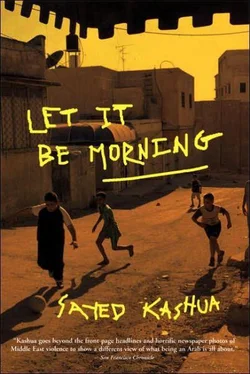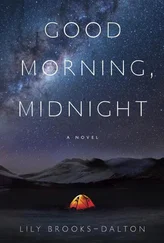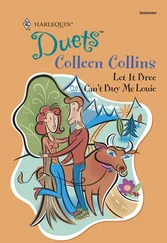My parents’ home is the first one on the northern edge of the village, then my older brother’s, then mine. The two brothers’ houses look exactly the same, and on the remaining piece of land they’ll build the fourth house, identical to ours, for my younger brother when he finishes school. All his life, my father has loathed fights over land, especially among brothers, which is why he made sure, long ago, to divide it up evenly among us. “So nobody says I gave one more or less than the rest,” he tells us. I don’t think my parents have heard anything about what’s going on. I’ll tell them I overslept and that I just came to say good-bye on my way to work. “Good morning,” I say, and they both answer. My mother is preparing something in the kitchen and my father is sitting on the pink sofa staring at another newscast on Al Jazeera. They don’t seem surprised to see me, despite the unlikely hour of my visit. My father sits up to greet me. “What do you think?” he asks me “Have they arrested anyone yet? What do they want anyway?”
“I hope God takes the lot of them,” my mother says, and wipes off the counter. “Hungry?”
“Not really. Maybe I’ll have a bite a little later,” I say. So my parents do know, and I try to check whether it’s because of something they saw on TV, because they couldn’t possibly have gone out yet. Where would they be going, anyway?
But none of the events in the village has been mentioned on television. My heart starts beating hard again, and I try to keep my body from trembling when my mother curses the Jews and says they’d almost had a heart attack the night before when someone came banging on their bedroom window at about three A.M. “Who could be knocking at such an hour?” my mother says. “We were sure something terrible la samakh Allah had happened to one of you or your children.”
It was my younger brother. He’d knocked on the door first, and when they didn’t hear him he knocked on their bedroom window, right over their heads. My younger brother was dead tired. My father says they could hardly make sense of what he was saying about what had happened, except that the security guards at the student dorms had come with the Border Police, had ordered all of the Arab students out of their rooms and had escorted every one of them home.
“Where is he?” I ask at once, shouting, even. “Where is he?” And my mother asks me to pipe down, because my younger brother is asleep. “Poor boy,” she says, “they kept them up all night.” I hurry into the room where my younger brother is sleeping, the room we once shared. I move the old door slowly, trying to keep it from squeaking in its frame. I look at him, his thin, long body stretched out on the bed. The bedspread he’d covered himself with has fallen off. I’m about to cover him, but then I realize it’s too hot for that. I notice I’m perspiring. I close the door again and hurry out. “I’m going out for a while. I’ll be back soon,” I tell my parents, checking their phone on my way out to see if it’s working. It isn’t. “It’s dead,” my father says. “Want something to eat?” I hear my mother ask from inside.
I pass by the housewives again, hear the nerve-wracking Egyptian music and the drums and the mechanical clapping. I hate that music, hate those housewives, I tell myself, and walk faster. I head up toward the mosque this time, which is more tiring. I’m not going to salam aleikum the SOBs sitting across from the mosque. I can’t stand them, them or their stories. How come everything’s so calm here, as if nothing’s happened? How I hate the people here. They live for their next meal and don’t think one step ahead. I hate them all, especially the older ones, who’ve neglected us and let the situation get as bad as it is. Obsequious nobodies. Look at us now. I’m mad at the lot of them. I don’t exactly know what’s happening, but it must be something much more serious than a terrorist cell or just some intelligence report or warning about a potential suicide bomber who’s entered Israel from Qalqilya or Tul-Karm and hidden out in the village. What the hell are they bringing the students home for? How could that tie in with a warning or a terrorist attack? What’s going on here damn it?
I check my mobile again, and the result only makes me feel worse. I’ll take the car and then see. First I’ve got to get the car back, though. The entrance to the village is less crowded by now, but there are still dozens of people milling around. The mayor isn’t there anymore. He stationed a few of his thugs in strategic spots to keep people from getting close to the barbed wire. There’s no more bottleneck and I can get my car out of there. Maybe I ought to go to the town hall first, to check whether they’ve had any news. The radio is still playing happy music, talking about the economy, rapes, robberies, Palestinian homes that have been demolished and a few terrorists who’ve been killed.
I check my wallet and decide I’d better go see my older brother at the bank on my way home, to withdraw a few hundred shekels. The bank is crowded now, because everyone who works outside of the village has decided to use this day off for errands. Luckily for me, I don’t have to stand in line. I head straight for the office where my brother works. “Say,” my brother greets me, “this is serious, isn’t it? People have been coming in and saying that the village is surrounded. What do they say in your paper?” only to discover that I have no way of being in touch with my paper. He goes on, “Must be some very red alerts, targeted alerts,” jargon that’s become second nature to Arabs living in Israel, thanks to the media, who tend to classify the warnings by their level of severity: general, hot, focused, targeted…
Everyone at the bank is discussing today’s events. Nobody’s in a hurry to use terms like closure or curfew. They prefer to wonder what it all means and why soldiers would be surrounding the village. Nothing like this has happened since the beginning of military rule. We’ve had the occasional roadblock and cars are often checked, but never — not even in the days of the Gulf War or the first Intifada — was there a decision not to let the inhabitants out. The customers at the bank don’t seem too rattled. Looks like when all is said and done they accept the decision. They’re upset to be losing a day of work, but they don’t see the events as a blatant breach of normal relations between citizens and their country.
I try to look calm too as I answer the questions they and the clerks fling at me. “What do you think, must be a serious terrorist roaming around here, huh?”
“I suppose,” I say. And one customer protests, “Shame on you, calling them terrorists. Say istish’hadi, say fida’i. What’s become of us? Are we going to start calling them terrorists too?”
A clerk with rectangular glasses and an official black suit, complete with white kerchief, says, “As far as I’m concerned, they can blow up wherever they want, but what right do they have to hide out here? Don’t we have enough problems already? They should just leave us alone. We don’t need to take part in this war.” Another woman standing in the line that’s cordoned off with colored chains says, “The problem is the children. What’ll happen if he hides his explosives in the bushes, God forbid, and the children play there and touch them by accident? Those Daffawiyya West Bank residents have no shame.” The customers burst out laughing. Somehow it was enough for them to hear that word, Daffawiyya, to start laughing. Of course people around here felt sorry for them when we saw them on TV, being shot at or trying to stage a protest. That wasn’t it at all. Most of the locals identified with the Palestinians on TV, but it’s as if the ones on TV were completely different people, not the same as the ones around here who loiter, looking for work. Those weren’t Palestinians but just workers who make trouble. No chance any of them would ever be on TV. People in our village identify with pictures from far away, forgetting that those pictures were taken a two minutes’ drive away from here.
Читать дальше












